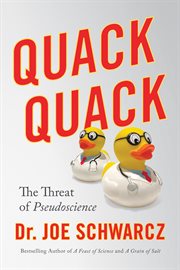Details
PUBLISHED
Made available through hoopla
DESCRIPTION
1 online resource
ISBN/ISSN
LANGUAGE
NOTES
Let the one and only Dr. Joe battle pseudoscience and cast a life preserver out to all those drowning in a sea of misinformation "Ultimately, the author successfully demonstrates how claims should be queried and analyzed before they are accepted." - Library Journal We are in a crisis. A tsunami of misinformation and disinformation is threatening to engulf evidence-based science. While quackery - loosely defined as the spread of false "knowledge," often accompanied by various versions of "snake oil" - is not a novel phenomenon, it has never posed as great a threat to public health as today. COVID-19 has unleashed an unprecedented flurry of destructive information that has fueled vaccine hesitancy and has steered people toward unproven therapies. Conspiracy theorists have served up a distasteful menu of twisted facts that create distrust in science. In Quack Quack, Dr. Joe Schwarcz, who has been battling flimflam for decades, focuses on the deluge of anecdotes, cherry-picked data, pseudoscientific nonsense, and seductive baseless health claims that undermine efforts to educate the public about evidence-based science. The wide scope of the topics drawn from past and present aims to cast a life preserver to people drowning in a sea of misinformation. A fun, fast-paced, and evidence-informed exploration of outrageous claims, "alternative" therapies, and "miracle cures" such as juice cleanses, detoxes, ear candling, raw water, and more. In a world filled with misinformation and twisted science, this is a must-read. Dr. Joe Schwarcz is the director of McGill University's Office for Science and Society, which has the mission of separating sense from nonsense. He hosts a radio show, appears on television, writes a regular newspaper column, and has authored 18 bestsellers. Dr. Joe is also an amateur magician and lives in Montreal, QC. I've often been asked about who sparked my enthusiasm, some would say obsession, for separating sense from nonsense. That credit goes to three individuals, two real and one fictional: Harry Houdini with his exposés of the antics of mediums, James Randi with his tireless efforts to unmask charlatans and promote critical thinking, and Sherlock Holmes with his emphasis on coming to conclusions only if they are supported by facts. I was introduced to magic at a young age by a performer at a birthday party and was intrigued enough to start reading about the subject. You do not have to delve deeply into the field before encountering Houdini, a man whose name to this day is virtually synonymous with magic. While I was taken with his exploits on the stage, my attention was also drawn to Houdini's crusade against charlatans who were using conjuring tricks to convince the gullible that they were communicating with the spirit world. The extent to which some people would go to fool others was an eye-opener for me. And very disturbing. Having become acquainted with the bizarre Conan Doyle-Houdini friendship, I was stimulated to start reading the Sherlock Holmes stories and became enthralled with the detective's emphasis on making scientific observations and "cause and effect" conclusions. The first story I read was "A Scandal in Bohemia," where I would come across a Holmes quote that I would reference throughout my life: "It is a capital mistake to theorize before one has data. Insensibly one begins to twist facts to suit theories, instead of theories to suit facts." Throughout my career, much to my dismay, I discovered that not everyone abides by this dictum. And my archenemy, pseudoscience, rears its ugly head when facts are tortured until they fit some pet theory. Over the last forty plus decades I've encountered numerous claims of paranormal abilities, hoaxes, miraculous cancer cures, and devices to diagnose or treat disease, all of which fall under the pseudoscience umbrella. In this collection, I will try to pr
Mode of access: World Wide Web







